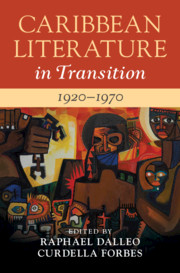Book contents
- Caribbean Literature in Transition, 1920–1970
- Caribbean Literature in Transition
- Caribbean Literature in Transition, 1920–1970
- Copyright page
- Contents
- Figure
- Contributors
- Introduction
- Part I Literary and Generic Transitions
- Part II Cultural and Political Transitions
- Part III The Caribbean Region in Transition
- Part IV Critical Transitions
- Chapter 18 Forging the Critical Canon
- Chapter 19 Forgotten Trailblazers
- Chapter 20 Recuperating Women Writers
- Chapter 21 Rhizomatic Genealogies
- Chapter 22 Writing Indo-Caribbean Masculinity
- Chapter 23 Writing and Reading Sex and Sexuality
- Bibliography
- Index
Chapter 21 - Rhizomatic Genealogies
Jean Rhys as Literary Foremother
from Part IV - Critical Transitions
Published online by Cambridge University Press: 16 December 2020
- Caribbean Literature in Transition, 1920–1970
- Caribbean Literature in Transition
- Caribbean Literature in Transition, 1920–1970
- Copyright page
- Contents
- Figure
- Contributors
- Introduction
- Part I Literary and Generic Transitions
- Part II Cultural and Political Transitions
- Part III The Caribbean Region in Transition
- Part IV Critical Transitions
- Chapter 18 Forging the Critical Canon
- Chapter 19 Forgotten Trailblazers
- Chapter 20 Recuperating Women Writers
- Chapter 21 Rhizomatic Genealogies
- Chapter 22 Writing Indo-Caribbean Masculinity
- Chapter 23 Writing and Reading Sex and Sexuality
- Bibliography
- Index
Summary
Following the publication of Wide Sargasso Sea, per Evelyn O’Callaghan, Jean Rhys held a singular and pre-eminent position as the most widely known and systemically surveyed anglophone woman writer, but despite her literary project of decolonization, various critics describe the position of Rhys and her text as initially and continuously contested. Indeed, the ‘absence’ of women writers during the male-dominated nationalist period as well as their later emergence in the USA accounts for African American genealogies of Caribbean women’s writing advanced by scholars such as Carole Boyce Davies and Belinda Edmondson. Attention to Rhys’ insider/outsider ambiguity in that nationalist literary era evinces her influence on subsequent Caribbean writing, however, and an examination of works by Caribbean writers, spanning both of what Donette Francis refers to as the ‘second’ and ‘third waves’, suggests that writers consistently return to Rhys’ iconic novel not only as an ur-narrative of place, space, and identity for the anglophone Caribbean female subject but also as a source of what Elaine Savory dubs Rhys’ ‘productive contradictions’ as a literary foremother. This essay thus examines Rhys’ work and the complexities of its reception diachronically in conversation with some of these writers, assessing its manifold genealogical impacts both in its time and the present. Writers discussed include Jean Rhys, Marlon James, Derek Walcott, Lorna Goodison, Robert Antoni, Michelle Cliff, Elizabeth Nunez, and Kamau Brathwaite.
Keywords
- Type
- Chapter
- Information
- Caribbean Literature in Transition, 1920–1970 , pp. 337 - 354Publisher: Cambridge University PressPrint publication year: 2021
- 1
- Cited by



